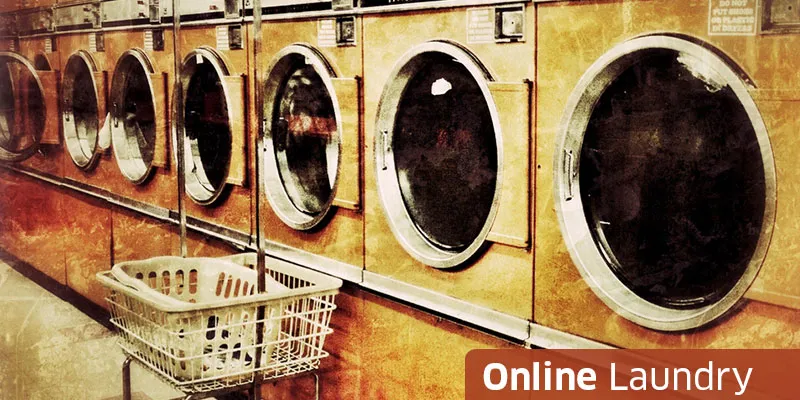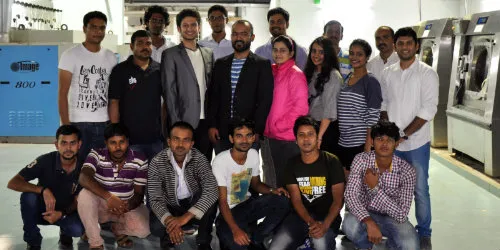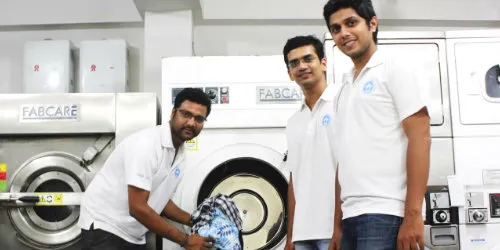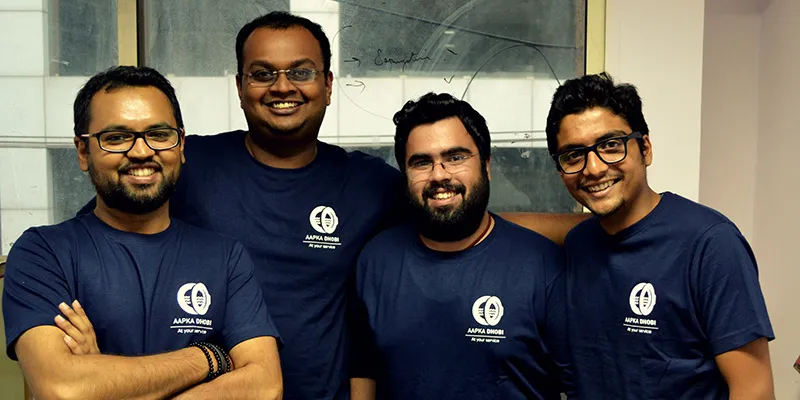Are online laundry startups spinning the right business model?
The estimated size of the laundry market is Rs. 2,20,000 crore, with the unorganised market (which includes dhobis, maid servants, and mom-and-pop stores) valued at Rs. 5,000 crores. The sector is fragmented with 7,67,000 establishments, 98 per cent of which are micro-sized laundries with fewer than 10 workers, says a report by Euromonitor International.
Praveen Sinha, Founder, Jabong, who has invested in an online laundry startup, Wassup, says, “The organised segment comprises 2-3 per cent of the entire laundry market. The online part will be close to 25 per cent of the organised segment, with significant growth potential.”
There are several factors that are driving the online dhobi services in India:
- Consumer-oriented services that have accelerated, owing to smartphone and Internet penetration in India on a massive scale.
- On-demand services on the rise be it grocery, food, or household chores.
- Increasing disposable income and unreliability of local unorganised players.
- Difficulty in getting maid servants and lack of specialised wash care by local dhobis.
- Unavailability of a one-stop solution for complete laundry needs.

Opportunities and challenges
Currently, the laundry market is largely dominated by offline players, who cater to the premium categories only. However, the price points set by these companies are not the best fit for a massive consumer base. Startups in the online laundry space are trying to fill the gap by offering comprehensive solutions at an affordable price, while challenging themselves to build sustainable business models.
Romil Bhakuni, Co-Founder, Dirk Da Dhobi, says,
Several laundries have popped up across the country over the past year, yet we have barely scratched the surface in terms of the addressable market. This is not a business based solely on logistics and delivering to your doorstep. The customer has to put a lot of trust in you and it requires you to have a good and sound understanding of the backend to deliver on your promise.

DirkDaDhobi.com is Bengaluru-based premium e-laundry service, which was started in April 2015 by Dirk Lewis and Romil Bhakuni. The startup has an exclusive 60,000 sq ft facility at Bidadi Industrial Area in Bengaluru that allows them to offer professional laundry services at an acceptable price, with a turnaround of just 48 hours.
DirkDaDhobi has the capacity to service over 5,000 clothes per day, but with growing demand, the plan is to expand the capacity to 10,000 clothes a day by the end of the year. The company has already serviced over 2,000 customers in just six months, and close to 25,000 pieces of cloth, including items like drapes, sofa covers, carpets, etc. of which 80 per cent have been dry cleaned.
Shortlisted for the NASSCOM 10k startup programme in India, it is currently the official in-society laundry partner for Purva Fountain Square, Raheja Pebble Bay, Godrej Woodman’s Estate, DSR Woodwinds Estate, and Mantri Paradise.
“Currently, a majority of our revenue comes from captive in-society customers, with a little over 20 per cent from our website and apartment adda. We plan to launch our app by mid-December, and have a healthy pipeline of societies; so, we expect there to be an even bigger spike over the next two to three months,” says Dirk.
Prateek Rana, Co-Founder, Laundry Anna, says,
With the ever-increasing cost of real estate and decreasing cost of maintaining an online platform, it becomes easier to manage without being asset-heavy. Maintaining strict quality checks and scheduling remains a challenge for an aggregators-outsourced model.
With processing units, in-house logistics, and technology, LaundryAnna claims they can pick up garments within two hours of the order and return them within 24 hours. The Bengaluru-based startup is growing at 25 per cent month on month and are clocking 25-30 orders daily with an average ticket size of Rs 400.
Gaurav Agrawal, one of the Co-founders at PickMyLaundry, says, “There are abundant opportunities as the market is at a very nascent stage and no one player is very big now. Any player who has better technology and operations, and a strong focus on customer satisfaction will emerge the leader.”
Launched in May 2015, by a team of three IITians, PickMyLaundry, an online laundry booking service offers an affordable solution for premium washing, dry-cleaning services, and wardrobe management. Their on-demand services include wash and fold, wash and iron, dry clean, steam press, shoe servicing, carpet cleaning, etc.

Currently operational in Delhi and Gurgaon, the startup has achieved a traction of 2,500 customers and 1,000 wardrobes. Going forward, it plans to launch revolutionary Express Services, whereby customers can opt for ‘In-a-day Delivery’ or ‘Overnight Delivery’.
PickMyLaundry charges on a per kg basis - Rs 50 for wash and fold, Rs 75 for wash and iron. It processes 2,500 clothes per day and is growing at 30 per cent month-on-month.
Supportive system
Startups are of the view that online laundry is a new segment, which is yet to be a proven business model in India. The mentoring from investors and incubators, and the presence of a supportive ecosystem, will help startups focus on unit economics despite the high initial costs.
Balachandar. R, Founder & CEO, Wassup Laundry says, “We have excellent angels guiding us. They have already been through this curve with other industries. As online laundry services mature, we will draw upon their experience of how to scale up without goofing up.”
Chennai-based Wassup offers services like laundry, dry cleaning, and shoe and bag refurbishments. The company has 30 pickup points called “aggregating hubs”, where the garments can also be dropped off by the customer. It raised $2 million in pre series A funding from Arun Chandra Mohan and Praveen Sinha, the Co-Founders of Jabong, and angel investor Micky Watwani. Earlier, it raised an amount of Rs. 4 crore as an institutional funding from Canada Bank.
Recently, it acquired Mumbai-based laundry services Chamak, the first acquisition in the online laundry space in India. Wassup is currently servicing 700 orders per day and aims to touch 5,000 orders per day in the next six months. According to Balachandar, Wassup’s vision is to elevate the 11 million dhobis in India through the Wassup Dhobi Partnership programme, which has been in its pilot phase over the past year.
Nidhish Patni, co-founder, Aap Ka Dhobi says, “The recent investments in the laundry space show that investors are very much aware about the potential of the industry, and they believe in changing market needs. By funding these startups, they are playing a very crucial role in making this biggest unorganised sector to an organised one.”
Aap Ka Dhobi guarantees the delivery of washed clothes within 48 hours. It provides all kinds of laundry needs like steam ironing, wash and fold, wash and steam iron, dry cleaning, starch and dyeing.

The startup has partnered with dhobis in Indiranagar, Koramangala, Whitefield, and BTM layout. At present, the company has more than 1,500 customers and is currently doing around 40-45 transactions per day. It plans to expand its services to the top 20 cities in the next two to three years.
What does the future hold?
Online laundry services are likely to witness lots of activities in terms of new entrants and funds coming in. An increasing number of players in a particular segment leads to healthy competition, which pushes businesses to bring in better services through innovation and some amount of consolidation.
Praveen states that investors and incubators can also definitely help guide entrepreneurs to make the right choices, and take the right decisions in a nascent and complex market like laundry.
“There are more than 20 laundry companies that have entered this laundry business. Laundry is a necessary evil, and even during recession, people will not stop washing their existing clothes,” says Satyam Mishra, Co-founder, Urban Dhobi.
Urban Dhobi is a Jaipur-based online aggregator for laundromats and is currently catering to six areas in the city. In just three months, the startup has acquired 2,000 users, of which more than 700 are (regular?) customers. In August 2015, the startup was incubated by Startup Oasis, a Jaipur-based incubation centre set up at the joint initiative of RIICO, Rajasthan’s premiere industrial promotion organisation, and the Centre for Innovation, Incubation and Entrepreneurship at IIM-Ahmedabad.
The startup charges Rs 150 for three kg of clothes and Rs 200 for five kg of clothes, and Rs 35 per kg for anything above that. The average ticket size is Rs 300, of which 65 per cent is paid to the laundromat. Currently, it has seven delivery boys.
Expert comments:
Balachandar says, “Online laundry services have tried to take the same path of discounting and forced customer acquisition through cash burn followed by e-commerce companies. But companies that will sustain are the ones doing justice over the long term for all stakeholders, and have a vision to build sustainable businesses.”
“Like the e-commerce segment, yes, the laundry segment too will witness a few startups shutting down and a lot of mergers and acquisitions. In the laundry space, since the industry backend is underdeveloped, there will have to be sustained efforts to upgrade the complete ecosystem rather than aggregate what is currently available,” he adds.
Vikram Upadhaya, Founder, GHV Accelerator, who has invested in PickMyLaundry, says,
“This space is likely to follow nature's age-old law - survival of the fittest. Only those businesses that are highly tech-enabled, and can execute and deliver a beautiful consumer experience at an affordable cost, will survive. Having said that, the Indian market is still big enough for at least a few players to coexist.”







